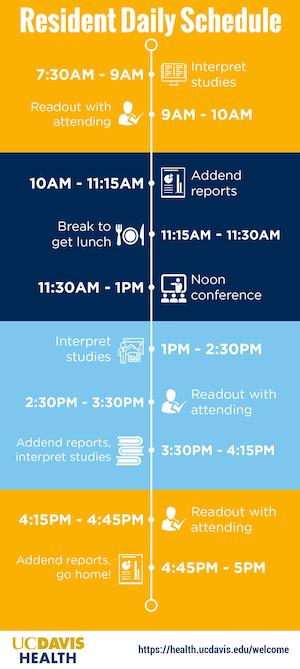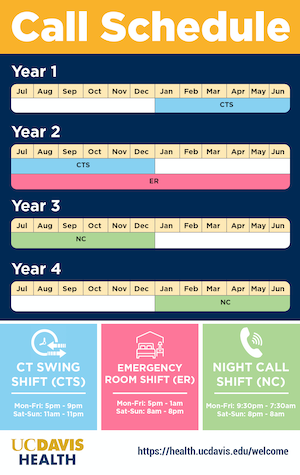Program schedule
Our annual rotation is visible for residents and faculty to view through Qgenda (also available as a convenient iOS or Android app) and is usually planned ~6 months in advance. Residents are allotted 5 weeks of vacation. Vacation requests are prioritized when the schedule is created. Vacations are taken in one 1-week and two 2-week blocks. Senior residents may opt to use flex days, breaking one of these weeks up into discrete days which can be used throughout the year.
One of the paramount things about training at UC Davis is that it is truly a comprehensive center. It is the only Level I trauma center for a catchment area of over 2.5 million people, and we have a dedicated pediatric hospital. Throughout our time at UC Davis and during our rotations at the Veterans Affair Hospital in Mather Fields, we are exposed to a wide range of pathologies. Additionally, because we are able to do nearly all of our training on the UC Davis campus, we see our coresidents daily which fosters our sense of community.
Curriculum by year
- Chest x ray - 4 weeks
- Chest CT - 4 weeks
- Body CT - 4 weeks
- Outpatient Body US - 4 weeks
- IR - 6 weeks
- Body Fluoro - 4 weeks
- Neuro - 4 weeks
- MSK - 4 weeks
- Pediatrics - 4 weeks
- Nuclear Medicine - 4-6 weeks
- VA - 2 weeks
- Vacation - 5 weeks
- *Enjoy every holiday and weekend off in your first 6 months of training
- Chest CT - 4 weeks
- Body CT - 4 weeks
- Body Intervention - 2-4 weeks
- IR - 4 weeks
- Body Fluoro - 2 weeks
- Neuro - 4 weeks
- MSK - 4 weeks
- Breast - 4 weeks
- Pediatrics - 4 weeks
- Nuclear Medicine - 4 weeks
- ER-5-6 weeks
- VA - 2-4 weeks
- Vacation - 5 weeks
- Chest CT - 2-4 weeks
- Body CT - 4 weeks
- Body Intervention - 2-4 weeks
- Body MR - 2 weeks
- Body Fluoro -2- 4 weeks
- Neuro - 4 weeks
- MSK - 4 weeks
- Breast - 4 weeks
- Pediatrics - 2- 4 weeks
- Nuclear Medicine - 4 weeks
- VA - 2-4 weeks
- AIRP - 4 weeks
- Night call - 4 weeks
- IR - 2 weeks (Year 3)
- Physics review course - 1 week (Year 3)
- Vacation - 4 weeks (Year 3) and 5 weeks (Year 4)
- *Request a wide variety of mini fellowships during Year 4 including but not limited to MSK, Neuro, Body MRI, Body US, Chest, Nuclear Medicine, Breast.
Call schedule
While most of the country has gone to 24/7 attending coverage, we here at UC Davis are fortunate to have preserved our independent night call program. This provides residents autonomy and experience balancing volume, accuracy, and efficiency.
Beginning the second half of the first year, PGY-2 residents start taking CT swing shifts (CTS). These shifts help residents gain confidence drafting radiographs and help managing consults and troubleshooting image acquisitions. Starting their second year, residents will begin signing preliminary reports on cross-sectional studies in addition to starting their emergency room shifts (ER). This allows a gradual transition into the night call shift (NC) and enables the resident to further strengthen their clinical abilities and independence. Each resident receives approximately 6 weeks of ER rotation spread out through the year. In July of PGY-4, residents begin the NC shifts. The majority of this rotation is managed independently by the resident, but faculty is available at all times. Each resident receives approximately a total of 8 weeks of night call.
Ultrasound technologists are available 24 hours a day to complete emergency and inpatient cases, allowing the residents to focus on image interpretation. We are fortunate to have administrative assistants 24/7 to help answer phone calls and get us in touch with ordering clinicians to report critical findings.
Elective opportunities
Fourth year residents are allowed to choose up to 3 months in any specialty for a mini-fellowship.


